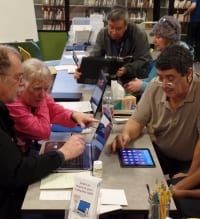 By Pamela Nyberg Kiesner, Bellingham Public Library
By Pamela Nyberg Kiesner, Bellingham Public Library
Libraries are in the midst of a renaissance, fueled by rapid advances in technology and changes in the communities we serve. No longer just places for books and reference help, we offer free services that transform lives. We support digital literacy and lifelong learning, contributing to education, employment, civic engagement and personal empowerment.
Yet libraries are often overlooked as catalysts for powerful individual and community change. The Bellingham Public Library is joining libraries throughout the country in the Libraries Transform campaign, highlighting the transformative nature of libraries and the critical role they play in our communities. We’ll use the campaign in the months ahead to inform and engage our community in greater understanding of library services and opportunities.
Today’s libraries are not just about what we have for people, but what we do for and with people. We’re working to change the perception that libraries are just quiet places to do research, find books and read. We hope to inspire a shared understanding of libraries as dynamic centers for learning in the digital age. Our services foster individual opportunities that ultimately drive the success of our communities.
Why are libraries transforming?
The ways libraries across the country are changing, and how people and communities are transformed by their libraries, are as nuanced and varied as those they serve. What’s behind these changes? Why are libraries transforming?
Because more than a quarter of U.S. households don’t have a computer with internet connection
The digital divide is real. Libraries play an essential role in bridging the divide and not just through access to computers. According to Pew Research, 63% of newcomers feel they would need some assistance learning how to use the internet. Libraries provide access to information by providing computers, internet access, and help for people learning to use them.
Because learning to read comes before reading to learn
A child’s brain develops faster from birth to age 3 than at any other point in their life – about two-and-a-half times more active than an adult’s, according to the Scholastic Family and Community Engagement Research Compendium. Practicing the alphabet, learning numbers, identifying colors and practicing writing names and words are all key factors in building the foundation for reading and school readiness. Libraries offer early literacy services.
Because there are millions and millions of search results for “2016 presidential election”
Information is growing at a breakneck pace. Every few days, humans create about as much information as we did from the dawn of civilization until 2003. It is a rapidly changing information environment for all who seek information, access to technologies, civic engagement, personal and professional growth, and simply the skills needed to survive and thrive in our digital world. Libraries help people cope in the digital age.
Because TXTS R fine, but SRSLY, PPL also need 2 C real sentences
Employers look for great communicators not “GR8” communicators. More than 73 percent of employers rank strong written communications skills as a key attribute they seek in employees, according to a recent study by the National Association of Colleges and Employers. So while text speak is fine for sending a quick message to a friend, like most things, it has a time and a place. Libraries promote literacy and communication skills.
Because of course you should bring your Grande Caramel Snickerdoodle Macchiato!
Americans are thirsty for knowledge, and coffee! Most libraries — including ours — now allow covered nonalcoholic beverages to be consumed in the library. This small but significant change demonstrates our commitment to creating convenient, comfortable, inviting environments. Libraries are welcoming for all.
These are just a few examples that showcase the changing nature of today’s libraries. Libraries transform, because transformation is essential to the people and communities we serve. Join us as we celebrate the value, impact and services provided by libraries. For more information, visit www.bellinghampubliclibrary.org
Pamela Nyberg Kiesner is the Director of the Bellingham Public Library and the chair of the Library Council of Washington .
Photo: The Bellingham Public Library provides “Tech Coaching” sessions, pairing people who have technology expertise with those seeking help with their devices. Providing computers, internet access and help for people learning to use them is among the many ways libraries transform lives.
